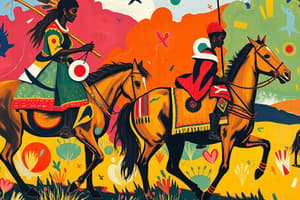Podcast
Questions and Answers
Match the following outcomes of the Cattle Killing movement with their descriptions:
Match the following outcomes of the Cattle Killing movement with their descriptions:
300,000 to 400,000 cattle killed = Result of the prophecy's directive 20,000 Xhosa deaths = Consequences of famine 30,000 Xhosa seeking work = Dependence on settler farms Shift in relationship with British = Increased reliance on food aid
Match the following groups involved in the Cattle Killing with their roles:
Match the following groups involved in the Cattle Killing with their roles:
Xhosa people = Perpetrators of the Cattle Killing British officials = Providers of food aid Colonial government = Reluctant interveners in local affairs Settler farmers = Employers of displaced Xhosa
Match the following effects of famine on Xhosa society with their implications:
Match the following effects of famine on Xhosa society with their implications:
Dependency on British aid = Weakened traditional leadership Resistance broken = End of conflict with settlers Acceptance of British governance = Desire for stability Population displacement = Increased labor needs on farms
Match the following key elements of the prophecy with their outcomes:
Match the following key elements of the prophecy with their outcomes:
Match the following historical shifts regarding the Xhosa with their significance:
Match the following historical shifts regarding the Xhosa with their significance:
Match the following groups with their actions during the Frontier Wars:
Match the following groups with their actions during the Frontier Wars:
Match the following historical terms with their descriptions:
Match the following historical terms with their descriptions:
Match the following years with their significance in the context of the Xhosa Wars:
Match the following years with their significance in the context of the Xhosa Wars:
Match the following outcomes with their causes:
Match the following outcomes with their causes:
Match the following terms related to the Xhosa culture with their definitions:
Match the following terms related to the Xhosa culture with their definitions:
Match the following characters with their roles in the conflict:
Match the following characters with their roles in the conflict:
Match the following types of farming with their characteristics:
Match the following types of farming with their characteristics:
Match the following events with their consequences:
Match the following events with their consequences:
Flashcards are hidden until you start studying
Study Notes
Historical Context of Frontier Wars
- Contact and conflict existed between Dutch farmers and Xhosa chiefdoms prior to British control of the Cape.
- Competition for grazing land intensified as both groups were cattle farmers.
- Three Frontier Wars occurred between Dutch settlers and Xhosa chiefdoms.
Frontier Wars Overview
- Known as Xhosa Wars or Kaffir Wars, lasting from 1779 to 1879.
- Involved the Xhosa Kingdom, British Empire, and Trekboers in the Eastern Cape of South Africa.
- Despite conflicts, trade and peaceful missionary activities were present.
Impact of British Intervention
- To mitigate land disputes, the British forced the Xhosa to relocate east of the Fish River in 1811-12.
- A large British army attacked the Xhosa, capturing cattle and escalating tensions.
- Subsequent decades saw additional Frontier Wars as Xhosa resistance continued.
Xhosa Resistance and Drought
- In 1850, Xhosa and Khoi allies launched an attack to reclaim their land.
- Fear of job loss from expanding wool farming contributed to the uprising.
- Although initially panicked, settlers faced a relentless British military response.
The Cattle Killing Prophecy
- By 1857, the Xhosa faced defeat after eight Frontier Wars, drought, and cattle deaths.
- A vision by Nongawuse prompted the Xhosa to kill their cattle and refrain from planting crops.
- The prophecy claimed that this act would restore their power and drive settlers away.
Consequences of the Cattle Killing
- Approximately 300,000 to 400,000 cattle were slaughtered based on the prophecy.
- Resulted in famine leading to the death of about 20,000 Xhosa individuals.
- About 30,000 Xhosa sought labor on settler farms due to resource depletion.
Shift in Xhosa-British Relations
- The weakened state of Xhosa led to a dependency on British food aid.
- The British government shifted from reluctant intervention to providing relief during the humanitarian crisis.
- The Cattle Killing eroded traditional Xhosa leadership structures, increasing reliance on British support.
Long-term Effects
- Increased acceptance of British governance among certain factions within Xhosaland amidst instability.
- The event marked a significant change in the socio-political dynamics between the Xhosa and British colonizers.
Studying That Suits You
Use AI to generate personalized quizzes and flashcards to suit your learning preferences.




